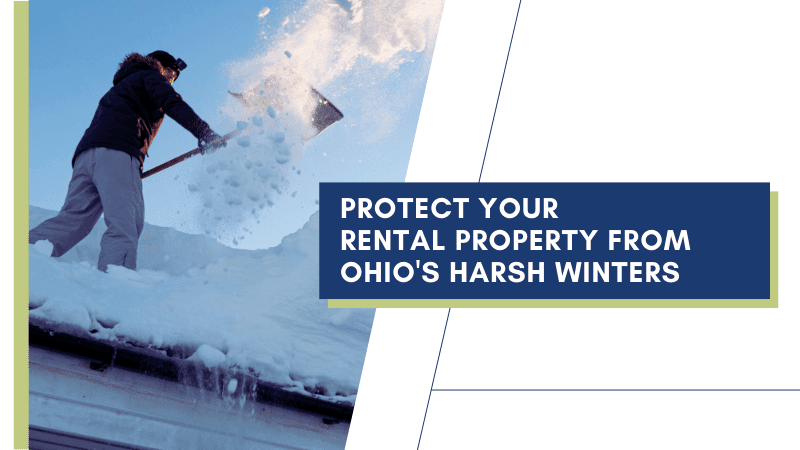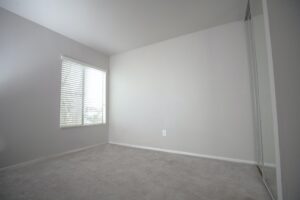
Ohio isn’t exactly known for its temperate winters. We can expect cold and we can expect ice and snow.
The elements that show up towards the end of the year can be devastating to property. If your home isn’t already in generally good condition, you’re going to face a lot of potential problems.
How can you prepare your Dayton rental property?
We have some ideas on what you can do, and in today’s blog we’re sharing some of the things that we help owners and investors do when we manage their properties.
Inspect and Service Dayton Heating Units
One of the first things you’ll need to think about is heating. Will you be able to reliably provide access to heat during the entire season? Your tenants will expect it and need it. Make sure your furnace and heating units are working the way they should be.
We strongly recommend having your entire HVAC system serviced twice a year as part of a good preventative maintenance program. If you do it before the seasons change, you can be sure the heating unit is ready for winter. It will also help you identify any potential problems early. It’s better to get the repairs and the updates out of the way before the heating system gets used full-time.
Schedule your local HVAC technician to come out to your rental properties to inspect, clean, and service the furnace, vents, and full heating unit. This will prevent a problem during the worst of the winter. You don’t want to be fielding phone calls from freezing tenants who are complaining about their lack of heat. Get ahead of any potential heating issues. It’s good for your property and it will show your tenants that you’re prepared and responsive.
Inspect Your Roof Before the Winter
We expect a lot from our roofs, so make sure you’re taking care of the roof at your rental property. It’s going to have to survive the winter and all of the snow, wind, and ice that comes with it.
Annual and seasonal maintenance on your roof can end up saving you thousands of dollars. It’s so much easier to replace a few shingles than it is to replace an entire roof. So, before the snow begins to pile up, get someone onto your roof to take a look. You want to make sure there isn’t any damage, and you also want to make sure there’s no chance that water can seep inside.
Hire a roof inspector or a licensed roofing company. They will look for loose, damaged or missing shingles that need replacing. It’s also a good idea to inspect the chimney flashing as well as any vents that may invite leaks. Patch up anything that needs work and enjoy the peace of mind that your roof is in good shape for the winter.
While we’re talking about roofs and how to keep water from entering the house unnecessarily, don’t forget to clean the gutters! The winter seems to stretch longer each year, and there’s a lot of time to collect sticks and leaves and rocks and feathers. Debris gathering throughout the winter months will only cause messy problems. If your gutters are clogged, you run the risk of attracting pests and pushing water into the property. That’s going to lead to bigger and more expensive problems.
Double-check the insulation in your home’s attic too, because that will help with energy costs through the winter.
Check Your Dayton Rental Property for Water
As winter gets closer, you need to think about the potential harm that leaks, frozen pipes, and other water issues can cause.
Look for any indications of water intrusion. This could be something like staining on ceilings or soft patches behind your walls and drywall.
Talk to your tenants about keeping the heat on to ensure pipes don’t freeze. The pipes most at risk tend to be those in unheated interior spaces like your basements, attic, or garage. But, you want to protect all the pipes running through your rental property, including those found in cabinets and exterior walls.
Try these simple tricks to protecting your pipes and reducing the risk that they’ll freeze:
- Set it and forget it. Advise your tenants to keep the thermostat set to the same temperature during day and night.
- Keep garage doors closed during the winter. This is especially important if there are water supply lines in that garage.
- Keep kitchen and bathroom cabinet doors open. This will allow warmer air to circulate around the plumbing, especially if your home has sinks on an exterior wall. This can easily be done by tenants at night, when the temperature tends to drop.
- Keep a light drip from faucets, especially those that deliver water from exposed pipes. When there’s a trickle of water moving through the pipes, they’re less likely to freeze.
If tenants are planning to be away from the home during the winter months, make sure they’re keeping the heat set at 55 degrees. You don’t want them turning it off entirely, otherwise your pipes are sure to freeze in their absence.
You also want to make sure your rental property or your building is well-insulated. Inspect the windows and doors. Trim back any tree branches or bushes that might break windows during a winter storm.
Think about increasing the insulation in your attics, basements, and crawl spaces. You’ll be able to protect the higher temperatures that rest there.
You can also prevent drafts by sealing cracks and openings around windows, doors, and at sill plates, where the house rests on its foundation.
Winter Landscaping and Lawn Care
Landscaping needs some extra love and attention in the winter.
Even if we’re only talking about a patio or a small courtyard, you want to make sure the space is prepared for cold weather. Encourage your tenants to take in any patio furniture or toys, bikes, and other belongings that they won’t be using. Trim back any dead leaves or branches that could become sharp objects during an ice storm.
Your irrigation system is one of the most likely places for a pipe to burst or freeze. Before the temperatures begin to drop, make sure you’ve drained all the water out of your lawn sprinklers.
If you’re renting out a property with an outdoor pool, make sure you contract with a pool company to come and drain the water. Then, have the pool covered and marked as off limits until the spring.
Educate Your Tenants on Seasonal Maintenance
Your tenants can help you have a successful winter at your rental property. While it’s a property owner’s responsibility to keep their property safe and habitable throughout the winter, you’re going to need a little help from the people who are actually living in the home.
Remind your tenants of their responsibilities and make sure they’re educated on how to handle some of the things that may come up during the winter. Start with establishing the expectations about who is responsible for snow removal and shoveling. This could be a function of the HOA if your rental home is in such a community. If not, you’ll have to decide if you want tenants shoveling the driveway themselves or if you want to hire a service to take care of these things. You can also include the cost in the rental amount.
Next, make sure your tenants understand that you want to be notified right away if there’s a problem at the home. You don’t want deferred and unreported maintenance to stretch out through the winter. Problems will only grow more complicated and more expensive with time.
Make sure your tenants know how to keep themselves safe. Walkways will be slippery. Icicles hanging off the house can be incredibly sharp and should be removed from the property and trees whenever possible.
Vacant Dayton Rental Properties
 If your rental property happens to be vacant during the winter, there are extra precautions that need to be taken. You’ll want to turn off your water supply completely if there’s not a tenant living there and you don’t have any scheduled maintenance work or cleaning to be done. A burst pipe might go unnoticed when there’s no one at the home. This will cause a lot of damage and cost a lot of money.
If your rental property happens to be vacant during the winter, there are extra precautions that need to be taken. You’ll want to turn off your water supply completely if there’s not a tenant living there and you don’t have any scheduled maintenance work or cleaning to be done. A burst pipe might go unnoticed when there’s no one at the home. This will cause a lot of damage and cost a lot of money.
Once you have turned off the water supply, drain all pipes of water by opening faucets and flushing toilets.
Vacant rental properties will need to be checked on from time to time. Hopefully, you’re working with an experienced Dayton property manager who can take care of this for you. If not, consider talking to a management partner who can keep you on track with seasonal and preventative maintenance, educate your tenants on how to have a safe winter, and make sure that your vacant property is in good shape and not unoccupied for too long.
We can do all of this and more. If you need any help, we’d love to serve as your Dayton property management resource. Contact us at ManCo Property Services.
